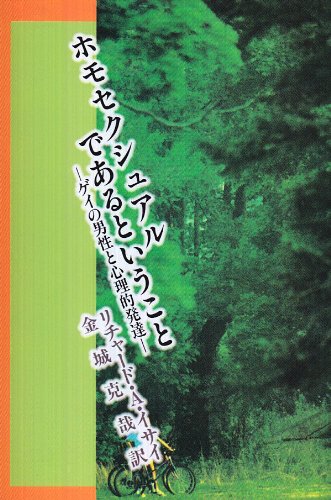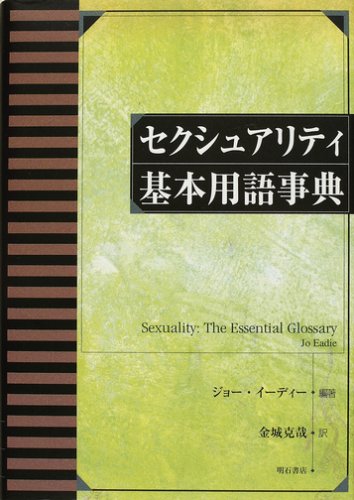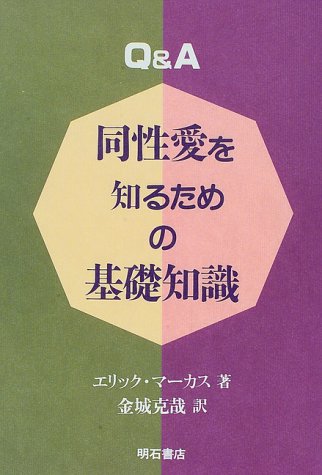293 0 0 0 IR 掘ってくれるタチいないっすか?--沖縄県の出会い系掲示板投稿文の計量的分析
- 著者
- 金城 克哉 Kinjo Katsuya
- 出版者
- クィア学会
- 雑誌
- 論叢クィア (ISSN:18832164)
- 巻号頁・発行日
- no.3, pp.39-61, 2010
本稿では沖縄地域の男性との出会いを求める男性が利用する出会い系掲示板の投稿文を言語学的視点から計量的に分析することを目的とする。無作為抽出によって得られた9,200のデータを分析した結果、(1)投稿者の8割が20代と30代によって占められており、(2)出会いの形態としては性的な接触を望むものが最も多いことがわかった。また、(3)容姿その他への言及については体型に関する言及が最も多く、その内普通より大きい体型に関する語彙が発達していることが明らかとなった。(4)表現の特徴としては願望を表す「たい」や「ほしい」を用いた表現が約4割を占め、受益表現では「~てもらう」よりも「~てくれる」という表現が多用されていることがわかった。
21 0 0 0 IR MSM出会い系掲示板における文末表現「っす」の用法について
- 著者
- 金城 克哉 Kinjo Katsuya
- 出版者
- 沖縄外国文学会
- 雑誌
- Southern review : studies in foreign language & literature (ISSN:09136754)
- 巻号頁・発行日
- no.24, pp.85-89, 2010-02
今回、MSMの男性が利用する出会い系掲示板の投稿文の分析調査を行った。調査ではさまざまな特徴的な言葉が見られたが、本稿では文末表現(助動詞)「です」の代替表現「す」「っす」に議論を絞る。
19 0 0 0 IR 同一テーマに関する二つのコミック作品群の比較計量分析 : BLコミックとゲイコミック
- 著者
- 金城 克哉 Kinjo Katusuya
- 出版者
- 琉球大学法文学部国際言語文化学科欧米系
- 雑誌
- 言語文化研究紀要 (ISSN:09194215)
- 巻号頁・発行日
- no.21, pp.1-20, 2012-10
This paper tries to analyze the similarities and differences of two comic groups, both of which deal with the same topic: men who love men. There has not been paid much attention to the linguistic expressions appearing in comic books, especially boys love (BL) comics and gay comics; although regarding the BL comics, there has been much argument concerning Yaoi and Fujoshi. This paper extracts linguistic expressions from 33 episodes from BL comics and 33 episodes from gay comics and analyzes using corresponding analysis. It is found that (i) there is little mention of body parts in BL comics, (ii) an utterance final particle ze, which expresses masculinity, is much used in gay comics, (iii) there appears much dash "―" which indicates silence in BL comics than gay comics.
- 著者
- 金城 克哉
- 出版者
- 九州地区国立大学間の連携に係る企画委員会リポジトリ部会
- 雑誌
- 九州地区国立大学教育系・文系研究論文集 = The Joint Journal of the National Universities in Kyushu. Education and Humanities (ISSN:18828728)
- 巻号頁・発行日
- vol.1, no.2, pp.No.11, 2014-03
本論は、ゲイ向け雑誌『G-men』誌に掲載された官能小説(「野郎小説」)に頻出する9つの男性器表現を述語との共起関係から特徴づけることを目的とするものである。従来このような性に関する言葉は学術的に研究されることがほとんどなかった。本論では因子分析により3つの因子を抽出し、また階層的クラスター分析によって9つの表現の類似度を示すことに成功している。セクシュアリティと言葉の関わりという点から、これまでなされていない新たな研究の可能性が示唆されたと言える。
11 0 0 0 IR インターネット上の出会い系掲示板を対象とした基礎的語彙調査
- 著者
- 金城 克哉 Kinjo Katsuya
- 出版者
- 琉球大学法文学部
- 雑誌
- 琉球大学欧米文化論集 (ISSN:13410482)
- 巻号頁・発行日
- no.54, pp.1-21, 2010-03
This study investigates vocabulary across 6 local bulletin boards for MSM (men who have sex with men). During the period of November 1 (2008) to April 30 (2009), there appeared 42,560 cases (target population) in the 6 bulletin boards. 2,400 units were selected using random numbers generated by Excel. Selected data were analyzed by KH Coder (UniDic as the electric dictionary and ChaSen as the analyzer). The result shows that the number of token words is 77,843 and the number of type words is 3,548. Among the high-frequent top 50 words, there appeared some unique nouns and verbs: those relating to the sex position, tachi (top) and uke (bottom), and those action verbs such as yaru (do), dekiru (can do), and horu (dig). It was also found that those high-frequent words are related each other.
- 著者
- 金城 克哉 きんじょう かつや Kinjo Katsuya
- 出版者
- 琉球大学法文学部国際言語文化学科欧米系
- 雑誌
- 言語文化研究紀要 (ISSN:09194215)
- 巻号頁・発行日
- no.22, pp.21-40, 2013-10
This paper tries to analyze characteristics of nine male genital expressions which often appear in gay-targeted erotic novels by applying multivariate statistics. Based on the observation of co-occurrence between these genital expressions and their accompanying verbs,it will be claimed that factor analysis identified three factors, namely, Chimpo factor,Chinko factor and Inkei factor,which express"virility or toughness","being embarrassed",and"organ" respectively. Also,principal component analysis reveals that"virility or toughness"is in the opposite end of"being embarrassed". Further, hierarchical cluster analysis will show us these nine expressions are grouped into three clusters. The academic discussion on these expressions is rare,so the analyses conducted in this paper contribute extensively to the study of sexuality-related expressions.
- 著者
- 金城 克哉 Kinjo Katsuya
- 出版者
- 琉球大学法文学部国際言語文化学科(欧米系)
- 雑誌
- 琉球大学欧米文化論集 (ISSN:13410482)
- 巻号頁・発行日
- no.57, pp.23-42, 2013-03
This paper tries to statistically analyze a Japanese singer and songwriter Noriyuki Makihara's original lyrics appeared in his seventeen albums from two view points. The first is to clarify the categorical ratio of the whole vocabulary. And the second point is to apply two cluster analyses (the hierarchical clustering and the centroid-based clustering) to see if these albums could form some clusters. The results show that,(i) the number of verbs outnumbers nouns in both types and tokens,and (ii) the centroid-based clustering shows that the albums before 2000 and after 2000 are divided except one album,and (iii) the hierarchical clustering shows that the first two albums forms one cluster,which could be supported by Makihara' s own words. Moreover,it is shown that the third cluster in the hierarchical clustering contains such words as ikiru (to live) and kokoro (heart) which displays Makihara' s ways of creating his lyrics after 2000.この論文は査読により、「研究論文集-教育系・文系の九州地区国立大学間連携論文集-」第1巻第1号(通巻第12号)に採択されたものである。
5 0 0 0 IR 「現代日本語書き言葉均衡コーパス」(BCCWJ)を利用した「くらい」・「ぐらい」の研究
- 著者
- 金城 克哉 Kinjo Katsuya
- 出版者
- 琉球大学法文学部国際言語文化学科欧米系
- 雑誌
- 言語文化研究紀要 (ISSN:09194215)
- 巻号頁・発行日
- no.20, pp.17-38, 2011-10
この論文は査読により、「研究論文集-教育系・文系の九州地区国立大学間連携論文集-」第5巻第2号(通巻第9号)に採択されたものである。
5 0 0 0 ホモセクシュアルであるということ : ゲイの男性と心理的発達
- 著者
- リチャード・A・イサイ著 金城克哉訳
- 出版者
- 太陽社
- 巻号頁・発行日
- 1996
4 0 0 0 セクシュアリティ基本用語事典
- 著者
- ジョー・イーディー編著 金城克哉訳
- 出版者
- 明石書店
- 巻号頁・発行日
- 2006
- 著者
- 金城 克哉 Kinjo Katsuya
- 出版者
- 九州地区国立大学間の連携に係る企画委員会リポジトリ部会
- 雑誌
- 九州地区国立大学教育系・文系研究論文集 (ISSN:18828728)
- 巻号頁・発行日
- vol.1, no.2, 2014-03
本論は、ゲイ向け雑誌『G-men』誌に掲載された官能小説(「野郎小説」)に頻出する9つの男性器表現を述語との共起関係から特徴づけることを目的とするものである。従来このような性に関する言葉は学術的に研究されることがほとんどなかった。本論では因子分析により3つの因子を抽出し、また階層的クラスター分析によって9つの表現の類似度を示すことに成功している。セクシュアリティと言葉の関わりという点から、これまでなされていない新たな研究の可能性が示唆されたと言える。This paper tries to analyze characteristics of nine male genital expressions which often appear in gay-targeted erotic novels by applying multivariate statistics. Based on the observation of cooccurrence between these genital expressions and their accompanying verbs, it will be claimed that factor analysis identified three factors, namely, Chimpo factor, Chinko factor and Inkei factor, which express "virility or toughness", "being embarrassed", and "organ" respectively. Also, principal component analysis reveals that "virility or toughness" is in the opposite end of "being embarrassed". Further, hierarchical cluster analysis will show us these nine expressions are grouped into three clusters. The academic discussion on these expressions is rare, so the analyses conducted in this paper contribute extensively to the study of sexuality-related expressions.この論文は「言語文化研究紀要」(22号2013年p21-40)に掲載された論文を査読し、「九州地区国立大学教育系・文系研究論文集」Vol.1, No.2(2014/3)に採択されたものである。
3 0 0 0 Q&A同性愛を知るための基礎知識
- 著者
- エリック・マーカス著 金城克哉訳
- 出版者
- 明石書店
- 巻号頁・発行日
- 1997
2 0 0 0 IR コーパス分析に基づく「〜にくい」・「〜づらい」表現の研究
- 著者
- 金城 克哉 Kinjo Katsuya
- 出版者
- 琉球大学留学生センター
- 雑誌
- 留学生教育 (ISSN:13488368)
- 巻号頁・発行日
- no.8, pp.19-35, 2011-03
本稿では大規模コーパスを用いて「~にくい」および「~づらい」の用法について調査を行い,考察を加えた。コーパスとして「Yahoo!知恵袋コーパス第一弾」(質間数:約300万,回答数:約1300万,期間:2004年4月-2005年10月)の中から,ベストアンサーの部分(期間:2004年5月-2005年4月)のデータ(約782万文,約550MB)を用いた。分析の結果,(1)「~にくい」と「~づらい」の出現数では前者が後者の5倍となっており,かなりの差が見られたこと, (2)出現数に偏りがあるにもかかわらず,存在動詞「居る」では逆に「居づらい」が「居にくい」の用例数を上回ったこと,また,従来指摘されていた「『~づらい』は無意志動詞とは結びつかず話し手自身に困難さの原因があることを示唆する」という用法に変化が見られることなどが明らかとなったが,これは近年「づらい」が多用される傾向にあるという指摘(国広2009,高島2007)を裏付ける証左となる。A research on the usages of Japanese tough constructions, "...nikui" and "...zurai" has been conducted utilizing a large corpus ("Yahoo! Chie-bukuro"). It has been discussed that "...zurai" expresses some difficulties originating in something except the experiencer him/herself. And it has been pointed out that the usage of "...zurai" is (gradually) expanding. This paper shows that the number of"...nikui" expression is five times as large as the number of "...zurai" expression, and that the"...zurai" expression is indeed used in where it could not be found out (i.e. in the cases where the difficulties are introduced by outer causes). The notable case is the verb of existence "iru"; the number of "izurai" cases (79) are far larger than "inikui" (5), and all the "izurai" cases demonstrate that the difficulty is triggered by outer causes (change of the situation).
- 著者
- 金城 克哉 Kinjo Katsuya
- 出版者
- 九州地区国立大学間の連携に係る企画委員会リポジトリ部会
- 雑誌
- 九州地区国立大学教育系・文系研究論文集 (ISSN:18828728)
- 巻号頁・発行日
- vol.1, no.1, 2013-10
本稿では槇原敬之の17枚のオリジナルアルバムの歌詞を分析し、まず語彙の構造を明らかにした。今回の調査では延べ語数においても異なり語数においても動詞が名詞を上回っていること、また英語の歌詞がかなり含まれていることがわかった。また、頻度30以上の119語を用いた主成分分析では例外的なアルバム(『不安』)はあるものの、概ね1999年までのアルバムと2000年以降とではっきりと分かれること、また階層的クラスター分析では最初期の2枚のアルバムが1つのクラスターを成していることが明らかとなった。これらのクラスターは評論家の意見、また槇原自身の言葉とも一致していることがわかった。この論文は「琉球大学欧米文化論集」(57号2013年p23-42)に掲載された論文を査読し、「九州地区国立大学教育系・文系研究論文集」Vol.1, No.1(2013/10)に採択されたものである。
1 0 0 0 OA 同一テーマに関する二つのコミック作品群の比較計量分析 : BLコミックとゲイコミック
- 著者
- 金城 克哉 Kinjo Katusuya
- 出版者
- 琉球大学法文学部国際言語文化学科欧米系
- 雑誌
- 言語文化研究紀要 : Scripsimus (ISSN:09194215)
- 巻号頁・発行日
- no.21, pp.1-20, 2012-10
This paper tries to analyze the similarities and differences of two comic groups, both of which deal with the same topic: men who love men. There has not been paid much attention to the linguistic expressions appearing in comic books, especially boys love (BL) comics and gay comics; although regarding the BL comics, there has been much argument concerning Yaoi and Fujoshi. This paper extracts linguistic expressions from 33 episodes from BL comics and 33 episodes from gay comics and analyzes using corresponding analysis. It is found that (i) there is little mention of body parts in BL comics, (ii) an utterance final particle ze, which expresses masculinity, is much used in gay comics, (iii) there appears much dash "―" which indicates silence in BL comics than gay comics.


